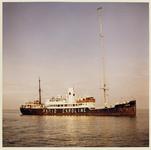The deposit includes Caroline Club papers and membership card, Radio Caroline leaflets (2), a souvenir colour booklet 'Radio Caroline and its Stars' and issue 2 of the magazine Beatwave containing an illustrated article - 'North & South: where it's at'. A practical wireless magazine issue (February 1967) containing an editorial about pirate radio, a copy of the Marine, &c., Broadcasting (Offences) Act 1967 and Offshore Echo's magazine containing sales information for pirate radio memorabilia. Further material consists of signed portraits of signed portraits of four disc jockeys (Jerry Leighton, Gerry Duncan, Tom Lodge and Chris More) and a scrapbook of newspaper cuttings with loose cuttings included.
Radio Caroline North pirate radio memorabilia
This material is held atManx National Heritage Library and Archives
- Reference
- IM 147 MS 11871
- Dates of Creation
- 1964-1968
- Name of Creator
- Language of Material
- English
- Physical Description
- 1 box
- Digital Content
Scope and Content
Administrative / Biographical History
Radio Caroline North was a pirate radio station which operated from 1964-1968 out of Ramsey Bay in the Isle of Man. Radio Caroline was founded by Ronan O'Rahilly (b.1940), who in the early 1960s promoted records for the Rik Gunnel Agency and managed artists and groups such as the Blues Incorporated. O'Rahilly was trying to promote his artists on established radios stations - Radio Luxembourg and BBC Radio - without much success. The British Broadcasting Corporation (BBC) held the monopoly for radio in the British Isles and stations were committed to promote sponsored record programmes. In the early 1960s the BBC played only one hour of pop music per week despite rapid changes across Britain in fashion, film and preferred music choices.
By 1964 O'Rahilly came to the conclusion that the only way to achieve any airtime for his artists would be to establish his own radio station. The idea of offshore radio appealed to him: he was aware of other successful offshore stations such as the Voice of America ship Courier and the Dutch offshore station, Radio Veronica. O'Rahilly raised enough capital to get the project started; he purchased the ex-Danish passenger ferry MV Fredericia (re-named MV Caroline ) and furnished her with the necessary radio equipment. Radio Caroline started regular (but unauthorized) broadcasts in March 1964 and played pop music all day. By July of that year Radio Caroline merged with Radio Atlanta (a competing offshore station on the MV Mi Amigo ), the former became known as Radio Caroline North and the latter was renamed Radio Caroline South. The South ship anchored off the coast of Essex and the North ship operated from the Isle of Man. The combined ships allowed the two stations to cover most of the British Isles transmitting new pop music. Radio Caroline's popularity was proven by its combined weekly audience of approximately 22 million listeners.
However the stations faced much opposition, for example it was claimed its broadcasts obstructed communications with British lightships and the lifeboat service and in April 1964 the General Post Office asked the International Telecommunications Union (ITU) to help stop the unauthorized broadcasts. The Post Office also withdrew Radio-telephone ship-to-shore facilities, cutting the station off from direct contact with its land based offices. By 1967 the UK Government implemented the Marine, &c., Broadcasting (Offences) Act 1967, which outlawed advertising on or supplying an unlicensed offshore radio station from the UK. The Isle of Man parliament Tynwald made attempts to exclude Radio Caroline North from the legislation and appealed to the European Court on the legality of the act.
On 31 August 1967 the Marine Act became law in the Isle of Man; by way of response Radio Caroline North broadcasted that the station would change its name to Radio Caroline International and continue to transmit. Its operational headquarters moved from London to Amsterdam and both North and South ships' fuel and supplies were tended to by foreign ports (North – Dundalk, Ireland; South – Ijmuiden, Holland). In 1968 both Caroline stations were still on the air however by 3 March of that year both ships were boarded by Dutch authorities (Wijsmuller Tender and Offshore Supply Co.). Caroline personnel were told that broadcasting was to cease, the studios were to be sealed and the transmitter crystal removed. The reason for seizure lay in the financial management of Radio Caroline: Wijsmuller Tender and Offshore Supply Co. had been contracted to provide a supply and servicing facility to both ships but had not been paid since late 1967. Both ships were towed to Holland. The Radio Caroline organization promised to return air imminently, however due to continued disputes over unpaid bills to the tender company Radio Caroline did not broadcast again until the 1970s.
Access Information
No regulations or restrictions are implemented on this material.
Advance notification of a research visit is advisable by emailing library@mnh.gov.im
Archivist's Note
The biographical information was gathered from the website http://www.offshoreradiomuseum.co.uk/page320.html (accessed 25 November 2015).
Fonds-level description created by Eleanor Williams (MNH Project Archivist), November 2015.

